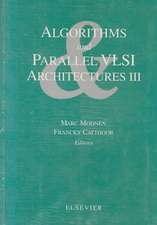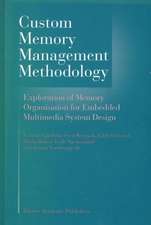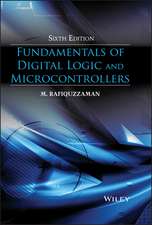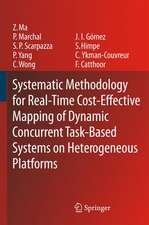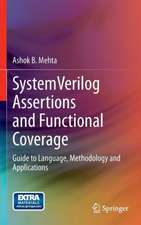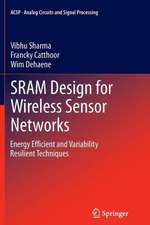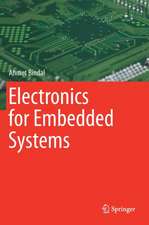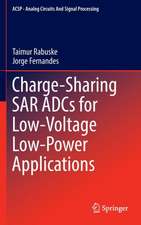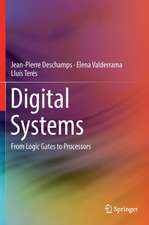Energy-Efficient Communication Processors: Design and Implementation for Emerging Wireless Systems
Autor Robert Fasthuber, Francky Catthoor, Praveen Raghavan, Frederik Naessensen Limba Engleză Paperback – 23 iun 2015
| Toate formatele și edițiile | Preț | Express |
|---|---|---|
| Paperback (1) | 945.30 lei 6-8 săpt. | |
| Springer – 23 iun 2015 | 945.30 lei 6-8 săpt. | |
| Hardback (1) | 951.29 lei 6-8 săpt. | |
| Springer – 30 mai 2013 | 951.29 lei 6-8 săpt. |
Preț: 945.30 lei
Preț vechi: 1152.81 lei
-18% Nou
Puncte Express: 1418
Preț estimativ în valută:
180.91€ • 188.17$ • 149.35£
180.91€ • 188.17$ • 149.35£
Carte tipărită la comandă
Livrare economică 14-28 aprilie
Preluare comenzi: 021 569.72.76
Specificații
ISBN-13: 9781489994882
ISBN-10: 1489994882
Pagini: 312
Ilustrații: XXII, 289 p.
Dimensiuni: 155 x 235 x 16 mm
Greutate: 0.44 kg
Ediția:2013
Editura: Springer
Colecția Springer
Locul publicării:New York, NY, United States
ISBN-10: 1489994882
Pagini: 312
Ilustrații: XXII, 289 p.
Dimensiuni: 155 x 235 x 16 mm
Greutate: 0.44 kg
Ediția:2013
Editura: Springer
Colecția Springer
Locul publicării:New York, NY, United States
Public țintă
ResearchCuprins
Context and State-of-the-Art.- Processor Template for the Wireless Domain.- Case Study 1: MIMO Detector.- Case Study 2: FIR Filter.- Case study 3: FFT.- Front-End Design for the Processor Template.- Back-End Design for the Processor Template.
Textul de pe ultima copertă
This book describes a new design approach for energy-efficient, Domain-Specific Instruction set Processor (DSIP) architectures for the wireless baseband domain. The innovative techniques presented enable co-design of algorithms, architectures and technology, for efficient implementation of the most advanced technologies. To demonstrate the feasibility of the author’s design approach, case studies are included for crucial functionality of advanced wireless systems with increased computational performance, flexibility and reusability. Designers using this approach will benefit from reduced development/product costs and greater scalability to future process technology nodes.
- Describes a DSIP architecture explicitly for the wireless domain, significantly more efficient than methods commonly in use;
- Includes an efficient DSIP architecture template, which can be reused for specific designs;
- Uses holistic design approach, considering all relevant requirements and combining many innovative/disruptive design concepts;
- Enables design portability, given changing target devices.
Caracteristici
Describes a DSIP architecture explicitly for the wireless domain, significantly more efficient than methods commonly in use Includes an efficient DSIP architecture template, which can be reused for specific designs Uses holistic design approach, considering all relevant requirements and combining many innovative/disruptive design concepts Enables design portability, given changing target devices

